
VALVE STANDARD The local valves industry needs to conform to a certain standard in terms of traceability
The local valves industry has become extremely competitive, especially since there has been an influx of products that have no traceability, says industrial automation, valve and control supplier Fluid Control Services owner Allen Maguire.
Many products are entering the local market from the Middle East, India and China, and some of them are inferior and have no serial or heat numbers, he tells Engineering News. The only way to trace a valve casting back to its mill is through a heat number, he notes. A heat number is similar to a lot number, which is used to identify production runs or any other products for quality control purposes.
He mentions that, without a heat number, there is no way of tracing a valve back to its origins; therefore, buyers, suppliers and end-users do not know what materials they are made of and whether the valve is of a standard that it should be.
These inferior, untraceable valves do not have any heat markings on them; for example, on three-piece ball valves, 1 000 psi/69 bar and the symbol WOG, which means water, oil and gas, are not traceable markings, adds Maguire. He states that, if no heat numbers are indicated, it is impossible to know whether the valves are manufactured of the correct material and are able to sustain pressure required.
“Valves are used in high-pressure, corrosive environments, for example, chemicals and high-temperature steam applications that the valves are exposed to. It is concerning that the purchaser is not considering the quality and traceability of valves as it could face significant safety risks.”
Maguire states that locally manufactured valves are of a good quality, proper engineering standards are followed during their manufacturing, and they are also traceable.
The local valves industry needs to conform to a certain standard in terms of traceability, and the safety of people working in environments where valves are used needs to be taken into account, Maguire comments, emphasising that traceability is critical, and that the industry should focus on the quality of valves and pneumatic and hydraulic actuators.
However, this is difficult to enforce, and unfortunately, will be enforced only when someone sustains an injury or dies as a result of inferior valves being used, he adds. He believes that it should be made illegal to import products that are inferior and do not have any traceability.
Meanwhile, Maguire says Fluid Control Services has been providing quotes for a few projects, including projects in the manganese and water sectors, but most projects are on hold, owing to a lack of finance.
The company is also considering opening an office in Cape Town to offer support to clients in the region.
Payment Terms Crippling Business
Maguire says unreasonable payment terms by some mines and large companies is an industrywide issue.
“Some of the companies are forcing us to have 120-day payment terms, while some of the mines are specifying 60- and 90-day payment terms. “This is a major challenge, as these companies are basically expecting other businesses to finance their business.”
This way of doing business is increasing prices throughout the supply chain, says Maguire.
Another challenge is that large companies are paying their accounts from different countries, such as Mauritius or India, which creates communication issues, owing to language barriers, and this further exacerbates the problem.
Maguire says international companies are “bullying” South African companies in terms of unreasonable payment terms and he believes that government should provide assistance in this regard.